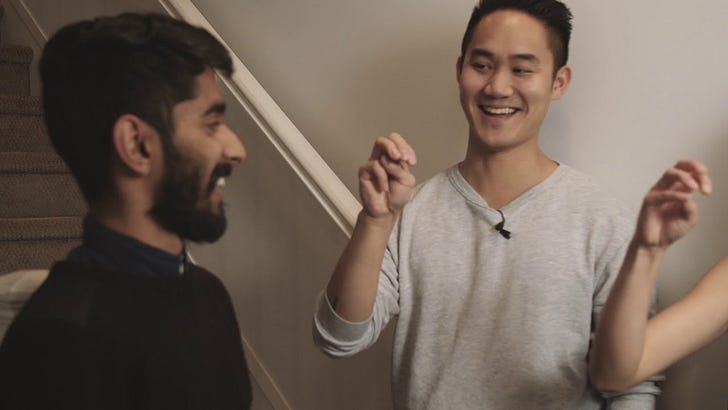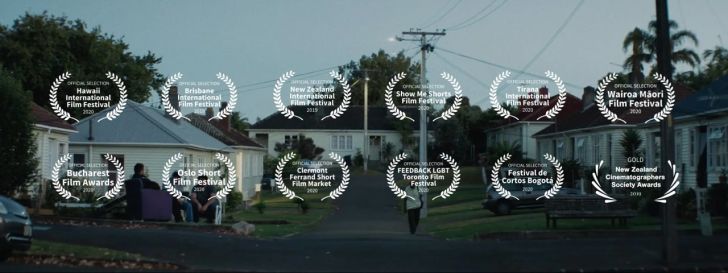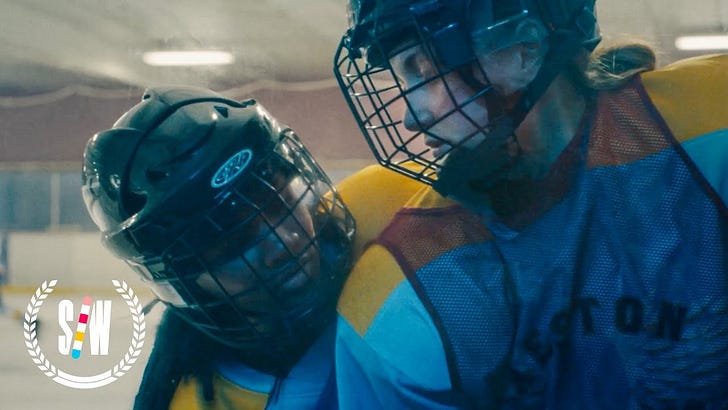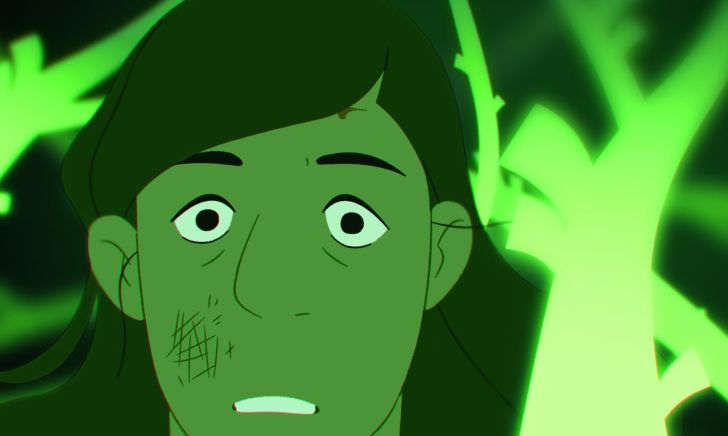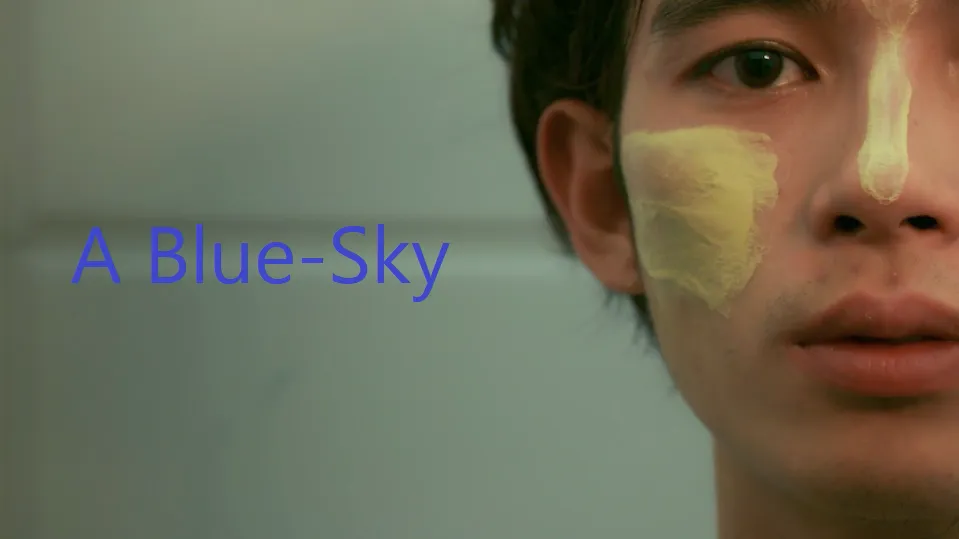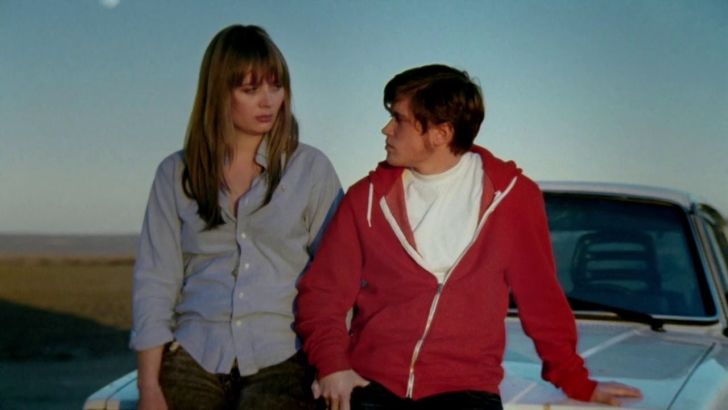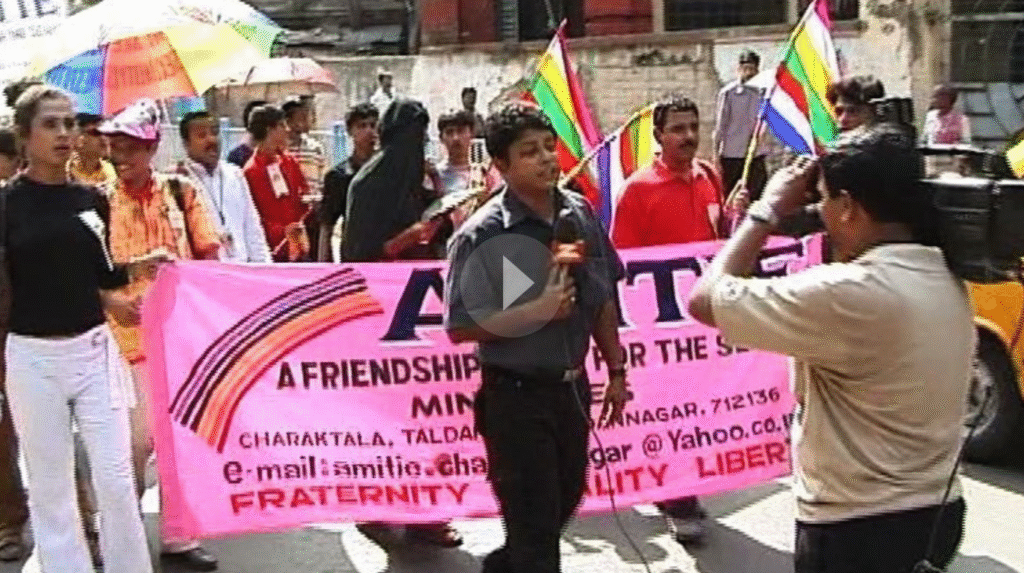Five queer short films live their values
I had initially intended this week’s recommendations to be a set of queer horror shorts for Halloween, but I’ve continued to be too consumed with outrage and heartbreak at the ongoing genocide of Palestinians by Israeli forces, and the attempts all around the world (particularly in the U.S. and the west) to not only suppress any kind of pro-Palestine resistance, but even to decimate Palestinian culture and existence. So I will continue to use this platform to keep Palestinian lives, art, and culture in our minds.
Only one of the films this week is by a Palestinian filmmaker, and none focus on Palestinian characters, because I’ve unfortunately exhausted the queer Palestinian short films that I can find available online with English subtitles. But last week I told you about Queer Cinema for Palestine, a global film festival that stands in solidarity with Palestine. Their stance is put into practice as well: the filmmakers who show their work at the festival (along with hundreds of other queer filmmakers around the world) have pledged to boycott the Israel-government sponsored LGBT film festival TLVFest, which is part of larger efforts to pinkwash Israeli apartheid.
The films I’m sharing this week were all shown at the 2021 Queer Cinema for Palestine Festival, which included screenings in Brazil, Bulgaria, Canada, Ireland, Italy, Korea, Kosovo, Lebanon, Spain, Tunisia, and online. The next festival will run in just over a month from November 29 to December 10, 2023 – you can sign up for updates on the festival here. The organization has also released a statement on Gaza calling on Israel to stop the current ramp-up in genocidal violence.
What you can do to support Palestinian liberation:
I’ve included pronouns for people mentioned when I can find them explicitly stated. When I cannot, I either use what I see being used for them in articles about them, or I just use their names.
“My work is a way of constantly coming out.”
Inferno, directed by Andrew Blackman, is an immersive documentary short about Brazilian artist Gui Taccetti, now based in New Zealand, who talks about growing up gay and Catholic, the depression and anxiety he experienced from religious trauma, and the way that it fuels his work. The film itself is intense and harrowing, almost horror-like in its atmosphere and tone; director Andrew Blackman does a fantastic job of taking the surrealistic and fantastical elements of Taccetti’s art and folding them in with the pain and fear that Taccetti experienced. But ultimately this is a hopeful story of how both Taccetti’s art and Blackman’s film about it can be healing – not only to Taccetti, but also to other queer people who experience them.
“It was clear from the outset that I wanted to tell a personal story. The initial concept came from a series of conversations Gui and I had about our personal lives and how they relate to our respective creative practices. I was looking for ways in which we could relate to each other both personally and creatively,” Blackman told Director’s Notes. “Some of themes and images were informed by Gui’s artist practice. What inspires him, what he references in his work, and how these relate to him as a person. Others were informed by his personal life, his identity, and his battle with depression and anxiety, which is what he is exploring with his art. Gui’s artistic and private personas are inseparable.”
Inferno
“In time you will find / The way of freaks: deface & have a riot.”
Coming of Agency, directed by Bogdan Balla, is music video for Sofia Zadar (they/them), an experimental pop musician and performer. The film matches the dreamy, nonlinear, queer nature of the song itself, playing around with gender fuckery, anger, and celebration all together. The film is explicitly political as well: a character reads Marco Mieli’s 1977 Towards A Gay Communism: Elements of a Homosexual Critique, complementing lyrics like, “I will not be impregnated with your seeds of conformity / I will not pray to the holy rails of progress”.
“I write from a critical perspective, one that mixes ecofeminism, queer theory, and anticapitalism. And a lot of the time I apply this lens through the metaphors and lyrics of my songs. At gigs as well I’d use the platform and opportunity of being in front of a group of people and holding the mic to open up critical conversations about social issues,” Zadar said in an interview with Cultartes. “Now I wouldn’t call that educational cause I definitely don’t consider myself a teacher and there are so many others who are better qualified to educate on these matters, but I do believe that all art has social and political implications, and you either choose to support the status quo by remaining silent about injustice or taming your message, or you position yourself clearly against oppression. And it’s important for me to always aim for the latter.”
Visual trigger warning: bright flashing lights from 3:10 to 3:18.
Coming of Agency [Sofia Zadar]
“To be honest, my name is not really Marco.”
Marco, written and directed by Saleem Haddad, opens with Omar (Zed Josef), a Lebanese-British banker living in London, refusing a phone call from his mother back home in Beirut. He instead focuses on getting ready for a guest: a sex worker (Marwan Kaabour) who introduces himself as Marco, recently arrived in the United Kingdom from Barcelona. Over the course of the evening, Omar and “Marco” find they have more in common than they initially realized – but that is also not enough for them to make their meeting easy and without conflict.
Creator Saleem Haddad was born in Kuwait to an Iraqi-German mother and a Palestinian-Lebanese father, has lived in Jordan, Cyprus, and United Kingdom at various points, and is currently based in Portugal. He is a writer who has published numerous short stories, essays, and his 2016 novel Guapa, as well as writing for television and film. A lot of his work focuses on queerness, colonialism in the Arab world, and alienation. Marco is his directorial debut. “I’m aware that in a simple conversation you can uncover a lot of dynamics,” Haddad said in an interview with Mohamed Altasseh. “And in my writing, I try to do that – to take these very simple interactions and then boil them down to their essence, in terms of what does that say about different issues that I’m interested in.”
Marco
“x”
I’ve actually been wanting to recommend Uporni duh | Rebellious Essence for a while, but I hadn’t found a theme to include it with until now. This animated short, which was written, directed, and animated by Ana Čigon, follows a beautifully multi-colored cat who goes to the Office of Ministry for Cat Affairs to apply for a passport. All goes well until the pink and blue cat clerks ask for the applicant’s sex.
The short is extremely funny, from the details of the office – there’s a scratching post behind the clerks’ desk – to the “meow”-based dialogue between the cats, to the hilarious ending. But it is also deeply poignant. Seeing the main cat’s confusion over being pressured into a box (not the kind of box cats usually like), and the pushback from the intimidating cat clerks, fills me with a kind of loneliness and wistfulness that is hard to describe. The choice to make a film about cats also throws into sharp relief just how absurd our own world is – asking “why does a cat’s sex matter?” or “why does a cat need a passport?” all too easily translates into “why do any of us need to be defined by sex or gender, and why do any of us need passports?” The answer, of course, is that we shouldn’t.
Uporni duh | Rebellious Essence

“One of the most disturbing things I’ve ever heard: ‘your image can be scary for the Brazilian middle class to see.’ Not because I’m an artist, but because I’m a Black trans woman.”
Carne | Flesh, written by Ana Julia Carvalheiro and Camila Kater, and directed by Kater, tells five stories of women’s embodiment: a girl who has dealt with fatphobia since childhood; a pre-teen beginning to menstruate; a Black trans woman who sees her body be hypersexualized, devalued, and framed as threatening; a middle-aged lesbian awaiting menopause as a new chapter in life; and a woman in her late seventies welcoming old age and continuing to learn how to live in her body, but not be ruled by it. Each story is gorgeously and viscerally illustrated by a different animator, all women as well, and each medium and art style is perfectly evocative of the emotions behind how each woman exists in her body and how she feels treated.
“The content dictated “Carne’s” form,” director Camila Kater told Variety. It was already decided that each chapter would be animated by a female animator, but the idea of using different media for the testimonies only came after I interviewed the first protagonist, Rachel Patrício. From that point on, I decided to create a sensorial synchrony between the visual form of animation and the stories themselves. For instance, Larissa Rahal talks about puberty and periods and the idea of using watercolor came just naturally. The well-done chapter is presented by the actress Helena Ignez, muse of brAZIL’S Cinema Novo, so using a real 35 mm film strip, and painting and scratching over it, seemed to be the perfect match.” Kater is currently adapating Carne | Flesh into an animated series.
Visual trigger warning: the last story, which plays from 8:20 to 10:40, has a lot of flashing and shifting animation, though I don’t know if the flashing is bright enough or the contrast distinct enough to be a trigger. But please proceed with caution!
Carne | Flesh

